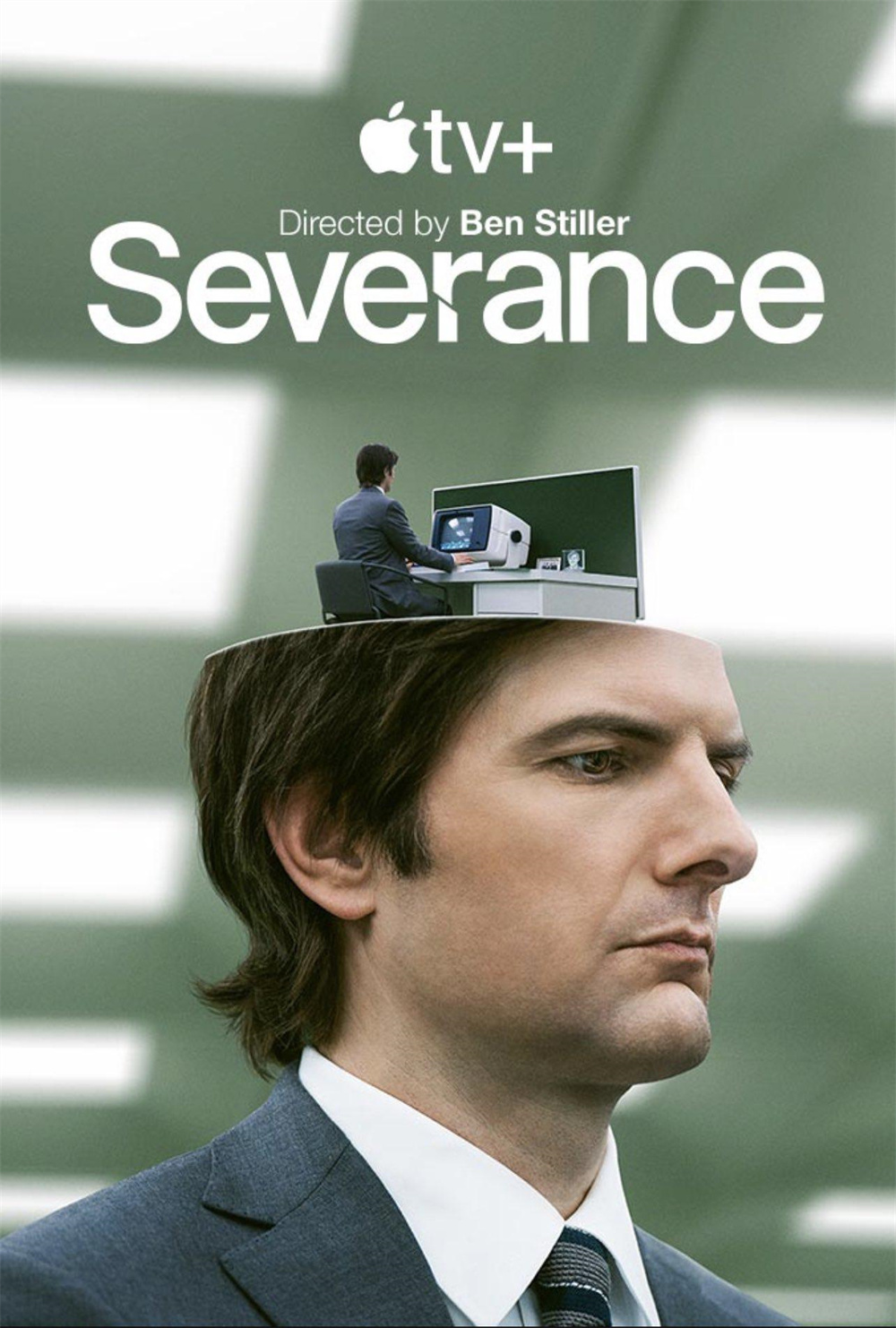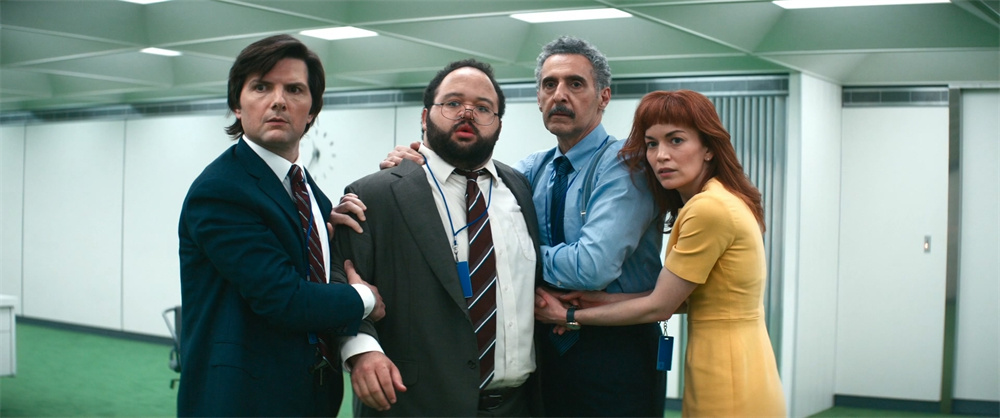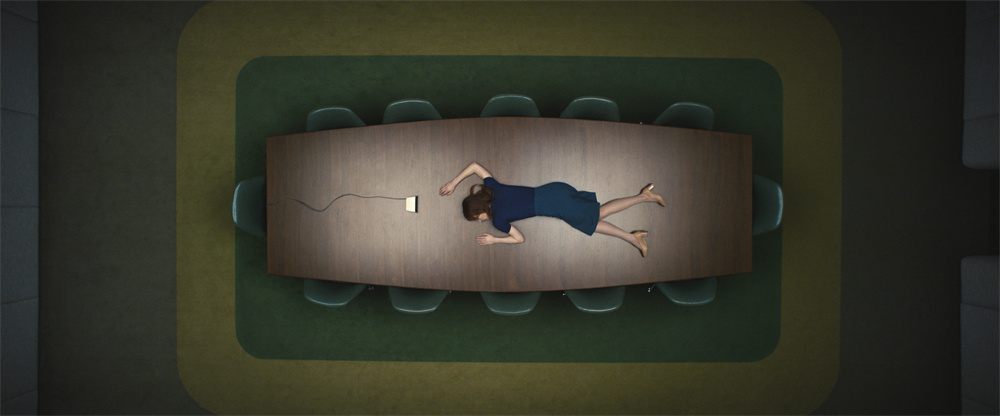If there is still a desire to resist in your subconscious, you will become a big beetle. Although it is inevitable to die alone, at least a moment before you die, you escape the shackles imposed on you and die in a state of freedom. Apple TV's Severance escalates the objectification and enslavement of the Kafka era with a new horror: it's you who voluntarily enslaves you. 
The four employees of Lumont's MDR department: Mark S (Adam Scott), Dylan G (Zach Cherry), Hurley R (Britt Lovell), Erwin B (John Turturro) is living through this nightmare. They voluntarily accepted the "cutting" brain surgery invented by Lumont Company, and completed the "transformation" in the elevator every day with the company's elevator as the boundary. When they are in the company, they only have common sense and knowledge without any personal memory; after leaving the company, they forget everything in the company and only have the memory of their personal life. The department they belong to is called the Data Refinement Department, and their work is to pick out numbers that bring a special feeling from the numbers on the screen and put them into one of the four classification buckets. They were taught that it was a "mysterious and important job". Although everyone has their own theory, no one can prove it. Viewers were more experienced than they were, presumably they were human experiments from Lumont, and the brain activity generated when processing the numbers was recorded and analyzed. The four classification buckets correspond to the "four elements/temperament" proposed by the founder of Lumon: sadness, joy, fear, and malice.
The candy given by the devil is quite tempting, and Ta promises that those who accept the cutting technique will have their own slaves. This slave will go to work in your place and take on all the "negative" experiences. The default premise is that the person with the primary personality (and thus not working) is the person. The sub-personality sent to work is not a human being, but a slave whose status is comparable to that of an animal. No matter how unpleasant it was at work, slaves were "sent" to work day after day by the master who had the power to decide.
The consequences of being deprived of personal history and leisure time are dire. The sub-personality in the office has no experience of rest and personal life, and has gradually become suspicious about the question of "who am I". Such a situation is difficult to maintain for a long time, so the MDR quartet has not worked in Lumont for more than ten years. When a person enters a state of cutting, he either starts to find himself, or sooner or later goes mad, and there is almost no third possibility. Those who "never leave the company" are incredibly docile. They can be seen as insane, the main personality is completely swallowed up by the sub-personality, and henceforth there is no private life, no sleep, only work.
Even if the main personality fully agrees with the segmentation technique, the subconscious resistance to it cannot be eliminated. The willingness to rebel one after another demonstrated by the MDR quartet attests to this. Hurley hates the job, Dylan wants his son's memories back, Erwin doesn't want to lose the love he met at work (he's retiring, meaning they'll be like strangers even if they reunite in life), Mark thinks Know the truth about the alter ego and Lumont.
Mark's motives were not quite the same as the other three. Whether others are out of love or instinct, what Mark is after, he doesn't know. That's what makes people human. Our curiosity in the face of "truth" cannot be stopped even by ourselves.
Are clones human? Science fiction works constantly discuss these issues, intended to arouse people's vigilance. A person who approves of a certain form can be treated as a person when you, for whatever reason, don't. Then once Pandora's box is opened, you, who are confident in winning and taking advantage of technology, may also be sealed in a cycle of terror.
While the first season revolves around Hurley and Mark, there are also important clues in Erwin. Everyone else agreed with the cutting technique and made the decision to go to work in Lumont. Erwin is the opposite. His main character listens to rock at night, drinks coffee, paints with black ink, and deliberately maintains a state of high sleeplessness. This successfully caused his sub-personality to wander at work, and several times saw black paint seep from the ceiling. Among the four people, only his main character did not seem to agree with the cutting technique, and he deliberately made his own subconscious in the drowsiness during the day to connect the main and auxiliary personalities.
According to the settings, connecting the primary and secondary personalities requires Lu Meng to activate a special "overtime awakening mechanism". This mechanism is not notified to employees in advance and only applies to "emergency". But in unofficial channels, people experiment with personality fusion in different ways, with Mark's office buddy Pitty (Yul Vascos) through underground surgery and Erwin through "trance."
The special feature of this play is that it shows the process of human beings willing to accept slavery. Science fiction works often directly enter the state where the technological revolution is completed and the social form is frozen, and storytelling begins from then on. In fact, what is more difficult to describe and more prophetic is the process of social and human evolution.
This season also leaves a thread - Burt G (Christopher Walken), who has a secret relationship with Erwin. Lumont gave the impression that no one could get away with it, but Burt was an exception. He held a successful retirement party and looked sane. Burt's secret won't be revealed until next season. By then, it doesn't matter whether the screenwriter can come up with an appropriate blueprint for Lumont, or whether it falls into the old bottle of the Egan family's self-proclaimed god and longing for immortality. The warning we have received: Beware of the devil. The devil can always change into your preferred image, promising you happiness, security, and wealth, but at a price. Don't try to escape pain. Pain is water, and it will always exist in some form. There is only one way to cut out all the unpleasant things, "be the children of Kiel (Egan)".

"Life Cutting" poster
It's a collection of horrors all in one. There are both the horror of schizophrenics who find out that they have different personalities, and the horror of different personalities fighting; there is also the nibbling of human nature by the efficient management methods of modern large companies, which is like a true record of cult brainwashing. There is also the sense of weightlessness that when the sense of time is confused and the power of the subconscious is stimulated, people's reason and control are weakened. This kind of situation is like in a dream that I feel that I am extremely powerful, and because it is difficult to think logically, my thinking is often interrupted, and it is difficult to walk.The four employees of Lumont's MDR department: Mark S (Adam Scott), Dylan G (Zach Cherry), Hurley R (Britt Lovell), Erwin B (John Turturro) is living through this nightmare. They voluntarily accepted the "cutting" brain surgery invented by Lumont Company, and completed the "transformation" in the elevator every day with the company's elevator as the boundary. When they are in the company, they only have common sense and knowledge without any personal memory; after leaving the company, they forget everything in the company and only have the memory of their personal life. The department they belong to is called the Data Refinement Department, and their work is to pick out numbers that bring a special feeling from the numbers on the screen and put them into one of the four classification buckets. They were taught that it was a "mysterious and important job". Although everyone has their own theory, no one can prove it. Viewers were more experienced than they were, presumably they were human experiments from Lumont, and the brain activity generated when processing the numbers was recorded and analyzed. The four classification buckets correspond to the "four elements/temperament" proposed by the founder of Lumon: sadness, joy, fear, and malice.

"Life Cutting" stills
In this show, numbers (4 and 9), colors (black/white, blue/green), graphics (a corporate bird's-eye view that resembles a brain slice), symmetry (everywhere), brainwashing, etc. are all mystical color. It could also be a cult movie without the tech element. The vision of the Egan family, who founded the Lumont Company, is also very ancient - a god-like ability to create and destroy life. Egan declared himself a god. Brain science is at the heart of this tech company. They do the devil's thing, playing with the brain and teaching the inner war.The candy given by the devil is quite tempting, and Ta promises that those who accept the cutting technique will have their own slaves. This slave will go to work in your place and take on all the "negative" experiences. The default premise is that the person with the primary personality (and thus not working) is the person. The sub-personality sent to work is not a human being, but a slave whose status is comparable to that of an animal. No matter how unpleasant it was at work, slaves were "sent" to work day after day by the master who had the power to decide.
The consequences of being deprived of personal history and leisure time are dire. The sub-personality in the office has no experience of rest and personal life, and has gradually become suspicious about the question of "who am I". Such a situation is difficult to maintain for a long time, so the MDR quartet has not worked in Lumont for more than ten years. When a person enters a state of cutting, he either starts to find himself, or sooner or later goes mad, and there is almost no third possibility. Those who "never leave the company" are incredibly docile. They can be seen as insane, the main personality is completely swallowed up by the sub-personality, and henceforth there is no private life, no sleep, only work.

"Life Cutting" stills
Lumont's incision is still two hurdles away from technical maturity: subconsciousness and love. The people in the cut-off office have no memory of life outside of work, but they retain common sense, knowledge, subconsciousness, and love. The first two are technically intentional, the latter two seem like unresolved bugs.Even if the main personality fully agrees with the segmentation technique, the subconscious resistance to it cannot be eliminated. The willingness to rebel one after another demonstrated by the MDR quartet attests to this. Hurley hates the job, Dylan wants his son's memories back, Erwin doesn't want to lose the love he met at work (he's retiring, meaning they'll be like strangers even if they reunite in life), Mark thinks Know the truth about the alter ego and Lumont.
Mark's motives were not quite the same as the other three. Whether others are out of love or instinct, what Mark is after, he doesn't know. That's what makes people human. Our curiosity in the face of "truth" cannot be stopped even by ourselves.
Are clones human? Science fiction works constantly discuss these issues, intended to arouse people's vigilance. A person who approves of a certain form can be treated as a person when you, for whatever reason, don't. Then once Pandora's box is opened, you, who are confident in winning and taking advantage of technology, may also be sealed in a cycle of terror.

"Life Cutting" stills
By the end of the first season, there's still a lot that's hard to explain. Why can the MDR quartet wander, explore, and negotiate plans for rebellion in this intelligent company that can be successfully implemented? The willful connivance of her boss Kerber (Patricia Arquette) is one reason (she is absolutely loyal to Lumont and has her own abacus), but not all. They appear to have been deliberately given the freedom, the room to awaken, and the emotional stimulation necessary to carry out this innocuous act of rebellion. This action is like a stress or trial and error experiment, a necessary step in perfecting the cutting technique.While the first season revolves around Hurley and Mark, there are also important clues in Erwin. Everyone else agreed with the cutting technique and made the decision to go to work in Lumont. Erwin is the opposite. His main character listens to rock at night, drinks coffee, paints with black ink, and deliberately maintains a state of high sleeplessness. This successfully caused his sub-personality to wander at work, and several times saw black paint seep from the ceiling. Among the four people, only his main character did not seem to agree with the cutting technique, and he deliberately made his own subconscious in the drowsiness during the day to connect the main and auxiliary personalities.
According to the settings, connecting the primary and secondary personalities requires Lu Meng to activate a special "overtime awakening mechanism". This mechanism is not notified to employees in advance and only applies to "emergency". But in unofficial channels, people experiment with personality fusion in different ways, with Mark's office buddy Pitty (Yul Vascos) through underground surgery and Erwin through "trance."

"Life Cutting" stills
The concept of "Life Cutting" is not unusual. The motivation for the characters to accept the cutting technique is also unconvincing and superficial. It's hard to imagine that Mark, who teaches history at the university, would voluntarily undergo cutting because the memory of losing his wife was too painful, in exchange for the "forgetting his wife period" that the main character couldn't detect for eight hours a day? Doesn't he understand that life without memory means nonexistence, and that "double life" robs life of its length and depth. Unless, like Erwin, he entered Lumont with an investigative attitude.The special feature of this play is that it shows the process of human beings willing to accept slavery. Science fiction works often directly enter the state where the technological revolution is completed and the social form is frozen, and storytelling begins from then on. In fact, what is more difficult to describe and more prophetic is the process of social and human evolution.
This season also leaves a thread - Burt G (Christopher Walken), who has a secret relationship with Erwin. Lumont gave the impression that no one could get away with it, but Burt was an exception. He held a successful retirement party and looked sane. Burt's secret won't be revealed until next season. By then, it doesn't matter whether the screenwriter can come up with an appropriate blueprint for Lumont, or whether it falls into the old bottle of the Egan family's self-proclaimed god and longing for immortality. The warning we have received: Beware of the devil. The devil can always change into your preferred image, promising you happiness, security, and wealth, but at a price. Don't try to escape pain. Pain is water, and it will always exist in some form. There is only one way to cut out all the unpleasant things, "be the children of Kiel (Egan)".










Comments